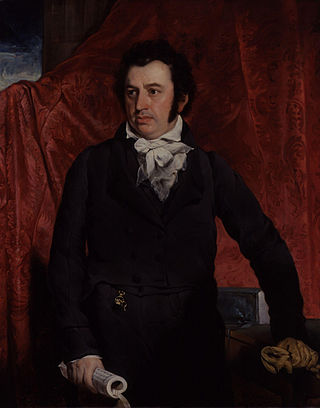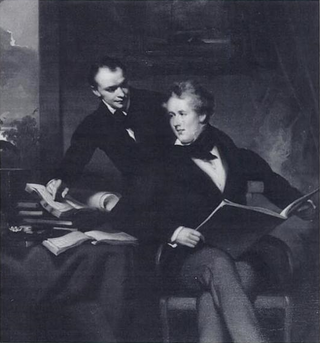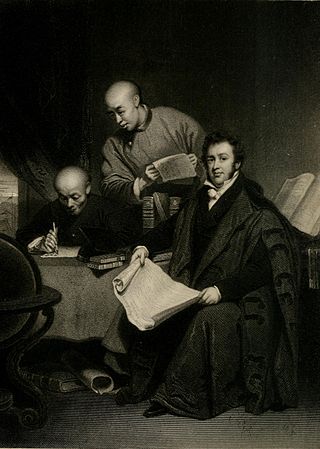Related Research Articles

Ying Wa College is a direct subsidised boys' secondary school in Kowloon, Hong Kong near Nam Cheong station. It was established in Malacca in 1818 by the first Protestant missionary to China, Rev. Robert Morrison. In 1843, the college was moved to Hong Kong. Being the only school with over 200 years of history, it is the oldest school in Hong Kong.

Liang Fa (1789–1855), also known by other names, was the second Chinese Protestant convert and the first Chinese Protestant minister and evangelist. He was ordained by Robert Morrison, the first Protestant missionary in the Qing Empire. His tract Good Words to Admonish the Age was influential on Hong Xiuquan, who went on to lead the Taiping Rebellion.

Karl Friedrich August Gützlaff, anglicised as Charles Gutzlaff, was a German Lutheran missionary to the Far East, notable as one of the first Protestant missionaries in Bangkok, Thailand (1828) and in Korea (1832). He was also the first Lutheran missionary to China. He was a magistrate in Ningbo and Zhoushan and the second Chinese Secretary of the British administration in Hong Kong.

Robert Morrison, FRS, was an Anglo-Scottish Protestant missionary to Portuguese Macao, Qing-era Guangdong, and Dutch Malacca, who was also a pioneering sinologist, lexicographer, and translator considered the "Father of Anglo-Chinese Literature".

John Robert Morrison was a British interpreter and colonial official in China. Born in Macau, his father was Robert Morrison, the first Protestant missionary in China. After his father's death in 1834, Morrison replaced him as Chinese Secretary and Interpreter to the Superintendents of British Trade in China. In 1843, he was appointed as Acting Colonial Secretary of Hong Kong and a member of the Executive and Legislative Councils, but died eight days later in Hong Kong from fever.

Samuel Dyer was a British Protestant Christian missionary to China in the Congregationalist tradition who worked among the Chinese in Malaysia. He arrived in Penang in 1827. Dyer, his wife Maria, and their family lived in Malacca and then in Singapore. He was known as a typographer for creating a steel typeface of Chinese characters for printing to replace traditional wood blocks. Dyer's type was accurate, aesthetically pleasing, durable, and practical.

Religion in Macau is represented predominantly by Buddhism and Chinese folk religions. During the period in which the city was under Portuguese rule (1557–1999) the Catholic Church became one of the dominant faiths, but nowadays it has greatly declined.

In the early 19th century, Western colonial expansion occurred at the same time as an evangelical revival – the Second Great Awakening – throughout the English-speaking world, leading to more overseas missionary activity. The nineteenth century became known as the Great Century of modern religious missions.

Griffith John was a Welsh Christian missionary and translator in China. A member of the Congregational church, he was a pioneer evangelist with the London Missionary Society (LMS), a writer and a translator of the Holy Bible into the Chinese language.

William Milne was the second Protestant missionary sent by the London Missionary Society to China, after his colleague, Robert Morrison. Milne served as pastor of Christ Church, Malacca, a member of Ultra-Ganges Missions, the first Principal of Anglo-Chinese College, and chief editor of two missionary magazines: Indo-Chinese Gleaner (English), and Chinese Monthly Magazine (察世俗每月統記傳). Due to Milne's distinguished role in his missionary field, the University of Glasgow granted him a Doctor of Divinity (D.D.) in 1820.
William Charles Milne(美魏茶 born April 22, 1815, died May 25, 1863) was a missionary to China in the 19th century. He was the son of missionary William Milne.

Since the arrival of Christianity in China, the Bible has been translated into many varieties of the Chinese language, both in fragments and in its totality. The first translations may have been undertaken as early as the 7th century AD, but the first printed translations appeared only in the nineteenth century. Progress on a modern translation was encumbered by denominational rivalries, theological clashes, linguistic disputes, and practical challenges at least until the publication of the Protestant Chinese Union Version in 1919, which became the basis of standard versions in use today.
Wat Ngong (1785–1867), also known by various other names, was a Chinese Protestant convert, evangelist, and writer from Guangzhou during the Qing dynasty. He was an early lithographer in Malacca, Macao, Guangzhou, and Hong Kong, possibly the first Chinese to master the craft.

Cai Gao (1788–1818), also known as Tsae A-ko and by various other names, was the first Protestant convert in mainland China. He has also been called the first Western-style type-cutter and letterpress printer.
Medical missions in China by Catholic and Protestant physicians and surgeons of the 19th and early 20th centuries laid many foundations for modern medicine in China. Western medical missionaries established the first modern clinics and hospitals, provided the first training for nurses, and opened the first medical schools in China. Work was also done in opposition to the abuse of opium. Medical treatment and care came to many Chinese who were addicted, and eventually public and official opinion was influenced in favor of bringing an end to the destructive trade. By 1901, China was the most popular destination for medical missionaries. The 150 foreign physicians operated 128 hospitals and 245 dispensaries, treating 1.7 million patients. In 1894, male medical missionaries comprised 14 percent of all missionaries; women doctors were four percent. Modern medical education in China started in the early 20th century at hospitals run by international missionaries.
The Presbyterian Church in Malaysia or GPM is a Christian church in Malaysia. Established as an independent synod in 1974, it currently has approximately 7,000 members in 100 congregations nationwide.

David Washington Cincinnatus Olyphant was an American trader in the Far East and "the father of the American Mission to China". He was an elected member of the American Board of Commissioners for Foreign Missions (ABCFM), the organization that sent the first American missionaries to China in 1829.

Andrew P. Happer (1818–1894) was a nineteenth-century American Presbyterian missionary who is known for his educational, medical, and religious endeavours in South China. Happer's missionary service lasted from 1844 to 1891, and during this time he worked in the suburbs and city of Canton. In the field of medicine, Happer created two dispensaries, the first was established in 1847 and the second in 1854. He also introduced higher Christian education to the Chinese youth of Canton through opening boarding and day schools, a training school, and eventually the Canton Christian College in the year 1888. Carrying out his duty as a Presbyterian missionary, Happer found the First Presbyterian Church where he was a pastor and converted many Cantonese people to Christianity, published books and other works focusing on Presbyterian faith, translated multiple religious works, and held editor positions for Presbyterian periodicals. After making his impact on the Cantonese people and laying down the foundation for future Presbyterian missions in South China, Happer left China for the last time in 1894.

Bible translations into Malay include translations of the whole or parts of the Bible into any of the levels and varieties of the Malay language. Publication of early or partial translations began as early as the seventeenth century although there is evidence that the Jesuit missionary, Francis Xavier, translated religious texts that included Bible verses into Malay as early as the sixteenth century.

The Bible Society of Singapore, Malaysia and Brunei was a nondenominational Christian organisation committed to translating and distributing the Bible in Singapore, Malaysia, and Brunei. It was the successor organisation to the Bible Society of Malaya, a branch of the National Bible Society of Scotland (NBSS). The Bible Society of Malaya prior to 1948 was a branch of the British and Foreign Bible Society (BFBS).
References
- ↑ Tiedemann, R. G. (November 2021). "Early Nineteenth-Century 'Murmurings and Disputings' in the Ultra-Ganges Missions". Studies in World Christianity. 27 (3): 232–252. doi:10.3366/swc.2021.0351.
- ↑ Daily, Christopher (2013). Robert Morrison and the Protestant Plan for China. Hong Kong University Press. pp. 159–192. ISBN 978-988-8208-03-6.
- ↑ "Ultra Ganges / South East Asia". Archives Hub. Retrieved 30 August 2024.
- ↑ Peh, Andrew (2019). Of Merchants and Missions: A Historical Study of the Impact of British Colonialism on American Methodism In Singapore from 1885 to 1910. Wipf and Stock Publishers. pp. 61–63. ISBN 978-1-5326-3437-6.